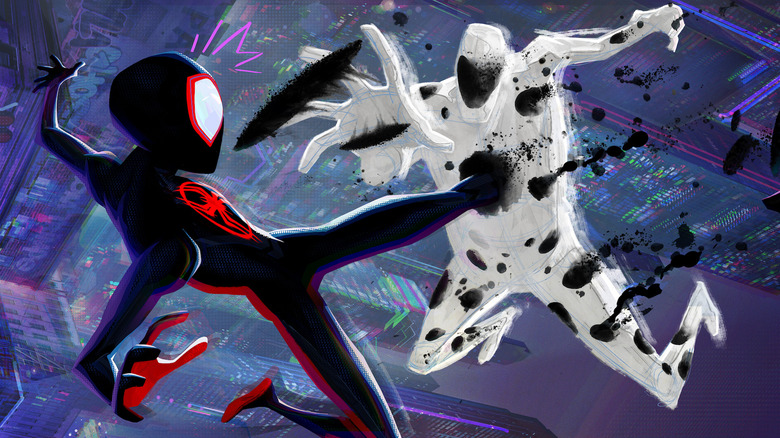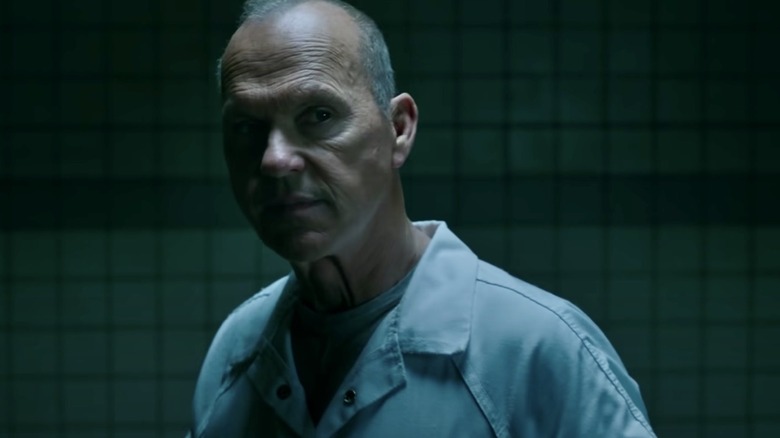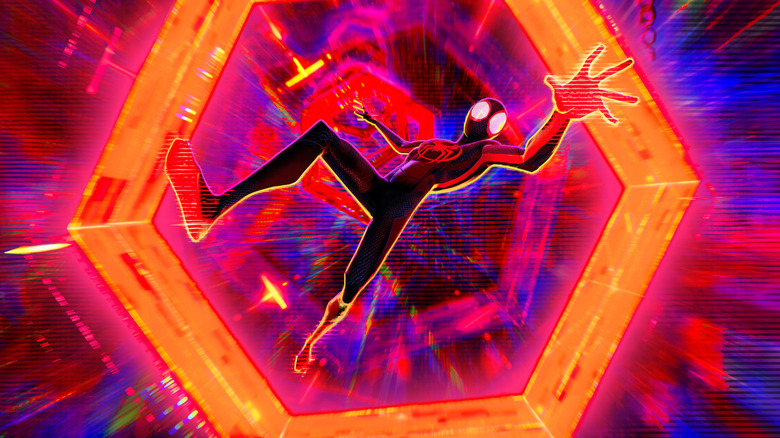Across The Spider-Verse May Actually Explain That Baffling Morbius Credits Scene
This post contains spoilers for "Spider-Man: Across the Spider-Verse."
At the beginning of "Across the Spider-Verse," Gwen Stacy (Hailee Steinfeld) encounters a version of the Vulture (Jorma Taccone) from "some old-timey, Leonardo Da Vinci dimension." "You're not my Vulture," she observes while fighting him.
Protectors of canon in Sony's Spider-Man Universe (we know there's at least one of you out there) may feel the same way about Michael Keaton's Vulture in the confusing post-credits scenes for "Morbius." What is Keaton doing there, outside the Marvel Cinematic Universe? Even he doesn't know.
"I'm not sure how I got here," he tells Jared Leto's Morbius. "It has to do with Spider-Man, I think. I'm still figuring this place out, but I think a bunch of guys like us should team up to do some good."
Obviously, this scene serves the practical function of setting up a potential Sinister Six (or Do-Gooder Six) movie for Sony, but it gets confusing when you have multiple multiverses in Hollywood and multiple Marvel characters controlled by different studios jumping back and forth between each other's movies.
In "Across the Spider-Verse," Jason Schwartzman's living plot hole, the Spot, pays a visit to Mrs. Chen (Peggy Lu) in her live-action convenience store from "Venom." Meanwhile, Venom and his human host, Eddie Brock (Tom Hardy), traveled to the MCU in the "Let There Be Carnage" post-credits scene. Venom licks a TV with Tom Holland's face on it (yes, there are multiple Toms flying about, too), but they never make it past first base or even meet in person; in the "Spider-Man: No Way Home" post-credits scene, Eddie heads back to his rightful universe.
Oddly, Keaton's Vulture makes the same cross-multiverse jump, despite the MCU being his home universe. "Spider-Man: Across the Spider-Verse" may explain why.
A super-collider-sized hole in the multiverse
"Across the Spider-Verse" shows footage of "canon events" involving Andrew Garfield and Tobey Maguire's Spider-Men, and it even name-checks Doctor Strange (Benedict Cumberbatch) and Earth-199999, aka the MCU. Strange's spell at the end of "No Way Home" returned said Spider-Men (and the movie's reformed villains, all transported in because they knew Spidey's secret identity) from the MCU to their respective universes. This is why it didn't make sense to see Michael Keaton's Vulture, let alone his Chitauri-tech MCU suit, in "Morbius" — because Strange's spell was supposed to set everything right and put everyone back where they belonged.
As Vulture (the website, not the supervillain) notes, Strange's spells have a way of producing "unforeseen consequences," however. Until now, fans could only speculate that the displacement of Keaton's Vulture (who learned Spider-Man's secret identity as Peter Parker in "Homecoming") might be one of those. "Morbius" director Daniel Espinosa added fuel to the "No Way Home" fire last year when he said in the press: "The events of 'No Way Home' had the effect of transferring Venom and Vulture (and maybe others ) back and forth between the MCU and the Venom Universe."
"Across the Spider-Verse" introduces another possible answer that could retcon what Espinosa said. The movie has Oscar Isaac's Miguel O'Hara refer back to the end of "Into the Spider-Verse," when Miles Morales (Shameik Moore) saved the universe from the Kingpin (Liev Schreiber)'s super-collider. Miguel indicates that Miles saved the whole multiverse, but left a hole in it big enough for outsiders like Donald Glover's live-action Prowler to make random incursions into other universes where they don't belong.
This suggests Vulture's incursion into "Morbius," which, as he says, "has to do with Spider-Man," might have happened because of Miles and the super-collider, and not Tom Holland's Spider-Man.
Cleaning up the mess Morbius left
In the history of motion pictures, there's never been one as important as "Morbius." At least, that's probably how Jared Leto thought of "Morbius" while making it. And you know what? There's something to be said, in acting or any walk of life, for treating the work in front of you like it's the most important thing in the world. The charitable view of Leto's infamous method acting would be to say that he's just committed to the bit.
Vampire doctor Michael Morbius, however, is more committed to actually biting certain people, and it remains to be seen whether anyone outside Sony is deeply committed to the prospect of a Morbius team-up. In the meantime, Leto's long- (we do mean long-)gestating vampire superhero flick left some fans bit by the curiosity bug, as they mulled its credits scenes and attempted to plug its nagging plot holes in their head (not unlike Miguel O'Hara, policing the Spider-Verse).
In some ways, it's unfair for "Across the Spider-Verse" to have to clean up the continuity mess "Morbius" left. The movie doesn't foreground overt connections to "Morbius" like it does with other Spider-Man films, but at one point, Miles Morales does allude to "Morbius" when he says of Miguel the Living Vampire: "A vampire good guy? I'd pay good money to see that."
This is just a meta joke, however, and while it might overlap with the MCU, "Across the Spider-Verse" has enough Spider-characters to juggle in its own "arachno-pyrenoid-polymultiverse" that it doesn't need to connect to Sony's Spider-Man Universe (which technically only includes "Morbius" and the "Venom" movies at this point). If you're still bothered by the logic gaps in Vulture's "Morbius" appearance, though, "Across the Spider-Verse" gives leeway to blame it on Miles Morales and Kingpin's super-collider.


